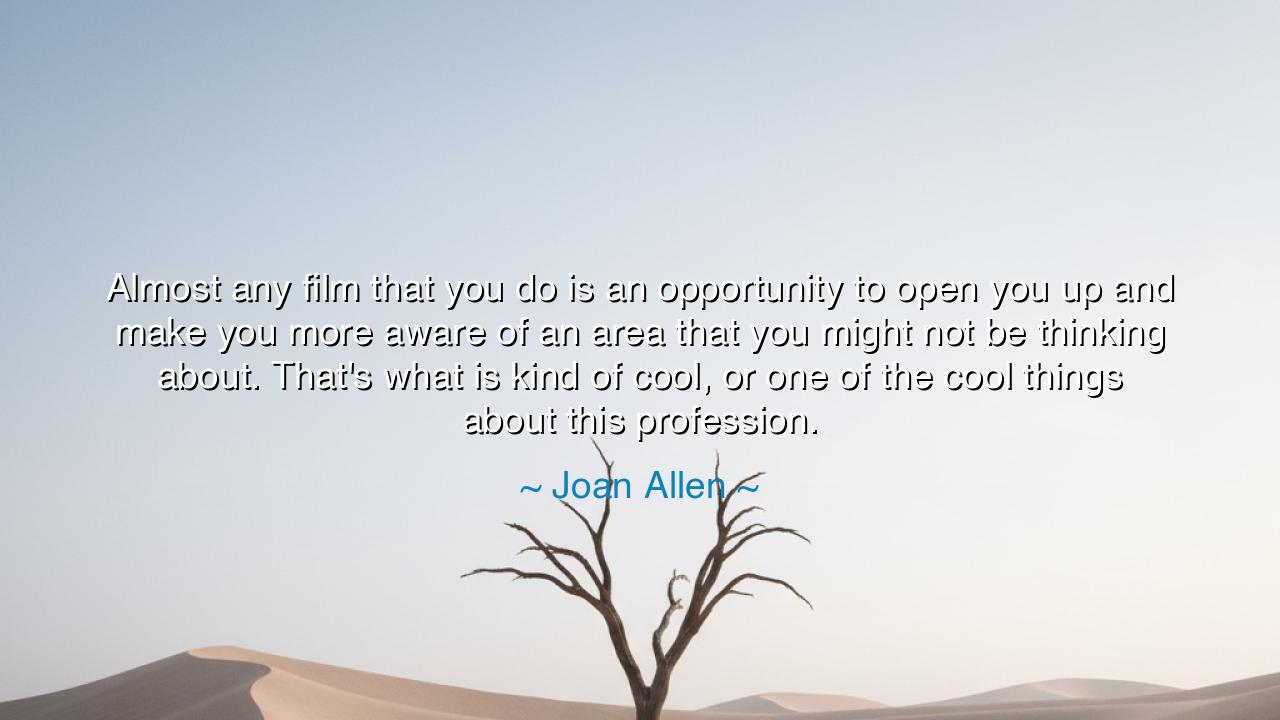
Almost any film that you do is an opportunity to open you up and
Almost any film that you do is an opportunity to open you up and make you more aware of an area that you might not be thinking about. That's what is kind of cool, or one of the cool things about this profession.






In the vast sea of life, we are often guided by the currents of the known, of the familiar aspects of our world. Yet, as Joan Allen wisely reflects, "Almost any film that you do is an opportunity to open you up and make you more aware of an area that you might not be thinking about. That's what is kind of cool, or one of the cool things about this profession," we are reminded that, in every experience, there exists the potential to broaden our horizons, to step beyond what we know, and to engage with realms of thought and emotion that were previously unexplored. Just as actors immerse themselves in diverse roles, so too are we called to embrace the opportunities that life presents to expand our awareness, to grow beyond our limitations, and to uncover new facets of ourselves.
In the ancient world, the greatest thinkers understood the transformative power of experience and reflection. Socrates, the revered philosopher of Athens, famously proclaimed that "the unexamined life is not worth living." His commitment to questioning the world around him was not a mere intellectual pursuit, but a method of growth, a way to expand one's understanding of the world and one's place within it. For Socrates, true wisdom came not from knowing the answers, but from remaining open to new insights, continuously seeking to uncover deeper truths. In the same way, Allen speaks of her profession not just as a way to perform, but as a vehicle for personal transformation, a way to constantly challenge and redefine herself by stepping into roles that expand her understanding of the world.
This philosophy was not limited to Socrates alone. The great artists and writers of antiquity understood the value of exploration and discovery through their crafts. Homer, in crafting the epics of The Iliad and The Odyssey, wove narratives that spoke to the human condition—to the struggles, triumphs, and complexities of existence. Through the characters of Achilles, Odysseus, and others, Homer invited his readers into worlds of unknown experiences, urging them to explore the limits of courage, loyalty, and human emotion. For Homer, the act of storytelling was more than entertainment—it was a means of awakening awareness in his audience, of pushing them to think beyond their own lives and see the world through the eyes of others. In this, we see the same principle that Allen speaks to: the idea that every performance, every act of creation, opens us to new possibilities, inviting us to understand ourselves and others in a deeper way.
Shakespeare, too, wrote plays that transcended his own time, exploring the complexities of human nature and the ways in which society shapes the individual. Through characters like Hamlet and Macbeth, Shakespeare invited his audience to confront their fears, ambitions, and morality, forcing them to look into the mirror of their own souls. His works were not merely plays; they were powerful vehicles for self-discovery and reflection. Just as actors today are transformed by the roles they embody, so too was the audience of Shakespeare's theater invited to open themselves to new understandings of life, to challenge their perspectives, and to grow beyond their previous limitations.
The beauty of Allen’s perspective is in the openness it invites. She recognizes that, in the act of performing, an actor’s role is not merely to embody a character but to engage in an ongoing dialogue with their own heart and mind. Each character, each story, becomes an opportunity to redefine oneself, to engage with unfamiliar experiences, and to shed light on areas of life previously overlooked. In this sense, the art of performance becomes a journey—one that mirrors the path of the ancient philosophers, artists, and thinkers, whose quest for understanding was driven not by certainty, but by the willingness to explore, to question, and to grow.
In our own lives, we are called to embrace this mindset, to recognize that every moment—whether in work, relationships, or personal growth—offers an opportunity to expand our awareness. We must not be afraid of change or uncertainty, for these are the very crucibles in which transformation takes place. Like actors embracing new roles, we too must be willing to step into the unknown, to face the unfamiliar with an open heart, knowing that, through each new experience, we are expanding our understanding of the world and our place within it.
The lesson from Allen's words is a call to embrace the unknown, to engage in life with curiosity, and to recognize that our greatest growth comes from our willingness to step beyond our comfort zones. In doing so, we redefine not just the roles we play but the lives we lead. Let us be like the great artists and thinkers of the past, who embraced every experience as an opportunity to grow and evolve, knowing that each step forward, no matter how small, brings us closer to the fullness of who we are meant to become.






AAdministratorAdministrator
Welcome, honored guests. Please leave a comment, we will respond soon